Balochistan protests Habib Jalib’s killing
The BNP called 40-day mourning and a three-day strike in Balochistan following the death of BNP leader Habib Jalib.
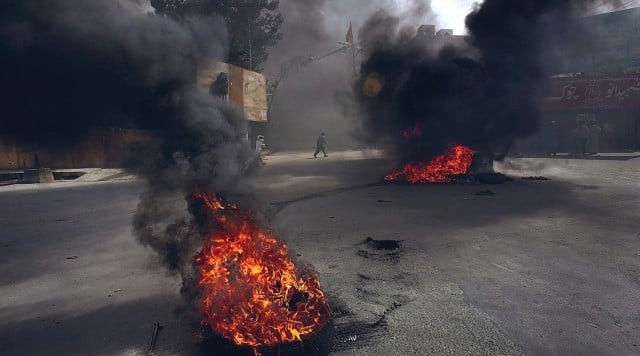
Balochistan protests Habib Jalib’s killing
Jalib’s murder drew condemnation from across the country, with Prime Minister Yousaf Raza Gilani ordering a judicial inquiry into the incident. The Baloch Musalla Organisation, a little known outfit, has claimed responsibility for the killing.
“Habib Jalib, 57, was reading a newspaper outside the shop of his brother, situated close to his house in Musa Colony when gunmen sprayed bullets and fled on a motorcycle,” a witness told The Expresses Tribune. Residents ferried him to the Provincial Sandeman Hospital where doctors pronounced him dead on arrival.
“Jalib received nine bullets to his upper torso from a close range,” Abdul Rasheed Jamali, a doctor at the hospital, told The Express Tribune. “He expired on his way to the hospital. And the assailants managed to flee after the firing,” added Shah Nawaz, a senior police officer.
He said the identities of the killers were not immediately clear, but that a manhunt had been launched.
Relatives and a large number of BNP workers turned up at the hospital, soon after the incident.
They rallied towards the Governor’s House and the Chief Minister’s Secretariat along with the body but a police contingent deployed on Zarghoon Road stopped them. Police fired tear gas shells to disperse the mourners. However, protesters managed to stage a protest at the Zarghoon Road intersection, defying the police, where they shouted slogans against the government.
After a two-hour long protest, the body was transported to his home for the final rites. Thousands of political workers attended his funeral held at his hometown Quetta. The authorities had put in place strict security arrangements to maintain order in the region.
Jalib’s killing sparked violent protests across the province. Irate political workers blocked key roads, disrupting traffic to and from Quetta. Protests were also staged on Jinnah Road, Double Road, Saryab Road, Zarghoon Road, Jail Road and other neighbourhoods of the city. Protesters also pelted traffic with stones and damaged signals. The entire Quetta city wore a deserted look within hours of Jalib’s killing as all shopping centres and shops were shuttered.
Tensions also gripped other towns and cities of the province, including Mastung, Sibi, Khuzdar, Turbat, Mand, Kalat, Lasbela, Hub, Dera Murad Jamali, Jaffarabad, Naushki, Dalbandin , Chagai, Bolan, Kachhi, Dadar, Harnai, Wadh, Naal, Wahshuk, Panjgur, Gwadar, Pasni and Manguchar, where political workers staged similar protests.
According to an official statement, all educational institutions, including Balochistan University, will remain closed for three days. The Balochistan Bar Association also announced three-day boycott of courts across the province to mourn the killing of Habib Jalib, who was also an eminent lawyer.
In Naushki, unknown men set fire to the Rest House of B&R and blocked the Quetta-Taftan section of the National Highway. In Panjgur, violent protesters set two government vehicles on fire and also destroyed a telecommunication cabinet, disrupting 500 telephone connections. In Khuzdar, protesters burnt the offices of PTCL, communication and works departments and offices of two NGOs.
The Quetta police chief told journalists that they have formed three committees to investigate Jalib’s killing. Ghulam Shabbir Sheikh said that DIG Investigations Qazi Wahid would supervise the investigation.
“We had informed Jalib several times about threats to his life but he refused police escort,” Sheikh said, adding that the Baloch Musalah Defa Tanzeem, had recently threatened to kill Jalib. Last month, the organisation had claimed responsibility for the killing of Naseer Lango, a BNP worker. Its spokesperson had told journalists by satellite phone that their target was Habib Jalib and that Lango was killed by mistake.
Jalib’s killing has been widely condemned by all nationalists and mainstream political parties, including BNP-Awami, JUI-F, PML-N, PkMAP and PPP.
Chief Minister Nawab Aslam Raisani condemned the murder, describing late Habib Jalib as a well-educated, seasoned and mature politician. In his condolence message, Raisani said Jalib’s killing was an attempt to destabilise peace and harmony in the province.
The chief minister also chaired a high-level meeting to review the law and order situation in the wake of Jalib’s murder. He directed law enforcement agencies to boost security in the provincial metropolis and other sensitive areas of the province in order to foil the designs of miscreants and anti-social elements who might try to exploit the situation to their interests.
President Asif Zardari and Prime Minister Yousaf Raza Gilani also condemned Jalib’s killing, with the latter ordering a judicial inquiry into the incident.
In a statement, the prime minister said that Jalib’s murder appeared to be an attempt to sabotage the government’s efforts to win back the support of the Baloch people. Last year, the government announced a development package, Aaghaz-e-Haquq-e-Balochistan Package, to address the sense of deprivation
Published in The Express Tribune, July 15th, 2010.


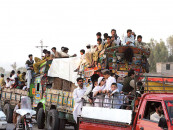
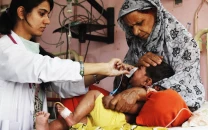
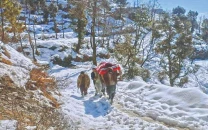
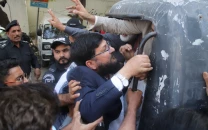













COMMENTS
Comments are moderated and generally will be posted if they are on-topic and not abusive.
For more information, please see our Comments FAQ